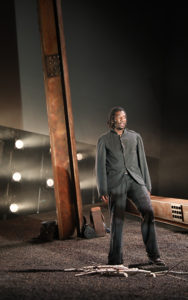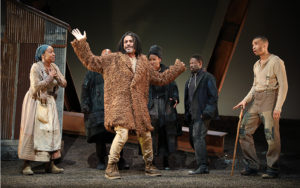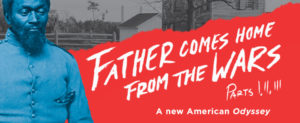A great old joke has it that “a camel is a horse designed by committee.” The same might be said about Civil War epic “Father Comes Home from the Wars,” directed by Liz Diamond, at American Conservatory Theater through May 20.
The committee in question is playwright Suzan-Lori Parks, an artist so deeply in love with her own voice that she can’t figure out what material fits and what needs to be jettisoned. She includes it all, like William Faulkner delivering to his editor his magnum opus in a wheelbarrow.
Unlike Faulkner, Parks didn’t have a ruthless editor to shape her material into something compelling. She instead offers a sprawling amalgam of history and personal quest that attempts to be both drama and comedy but ultimately succeeds as neither. The story at its core is quite simple: a slave named Hero (James Udom, superb) elects to serve as valet to his “boss master,” a Confederate colonel (Dan Hiatt) who has answered the call of duty and is headed to the war. Hero wonders if he should go or not, to the point of almost cutting off his own foot to render himself unfit, a fate that has already befallen his friend Homer (Julian Elijah Martinez). He’s also reluctant to say goodbye to his love Penny (Eboni Flowers) and other members of his community, but the lure of adventure, the intoxication of wearing a uniform, and the promise of freedom at the end of his servitude overwhelm his better judgment and off he goes. There are mentions of Hero’s dog Odyssey, who has run off, but we never see him.

“Father Comes Home” follows a traditional three-act structure, with enough characters and plot devices to fill a two-season PBS series. In the first act, we meet Hero and other members of his community, their shabby housing represented by the rusty façade of a corrugated metal shack. (Scenic design by Riccardo Hernandez.) This introduction, itself introduced by a mellifluous guitar-playing musician (Martin Luther McCoy, excellent), consumes the better part of an hour and segues directly into Act II, which finds Hero, the Colonel, and a wounded-and-captured Union soldier (Tom Pecinka) camped out in a forest within earshot of battle but safely away from it, the damage of war and the forest where they’re hiding represented by huge upended I-beams, more 1945 Berlin than 1865 Appomattox.
The Colonel preens, drinks, and rants, and during lulls in encroaching cannon fire, the three of them engage in a free-wheeling discussion of personal and social freedom, identity, status, value, ownership, man, god, law, and destiny. This act is exceptionally well done by three skilled actors and were it fully fleshed out might prove to be a satisfying resolution to the questions raised in Act I. Or not—the playwright might have her characters ask these questions and leave them for the audience to ponder.
Act III opens with the rusty shack superimposed on the remnants of war, with three runaway slaves cowering on its porch. Over the hill comes what appears to be a crazy homeless person in a wooly bathrobe, flitting about, flipping his hair and gushing about the fates of Hero and the Colonel. A new character introduced in the last act—Parks clearly disregards the laws of drama here—and one who had many in the opening night audience mumbling “WTF?” This crazy homeless person proves to be Odyssey, Hero’s missing dog, who has followed his master, at a distance, to the war and back and has come home to tell the tale. He’s comic relief, like the gravedigger in “Hamlet.”

A talking dog. We are now solidly in Uncle Remus and Brer Rabbit territory.
Odyssey (ACT veteran Gregory Wallace) spins an elaborate tale, provoking many laughs, and informs the community that Hero isn’t dead as they believed, but in fact survived and is coming home. And Hero does just that, arriving with gifts for Homer and Penny, and a copy of the Emancipation Proclamation that he has copied by hand but never reads aloud. Their reunion is warm and reassuring until Hero lashes out wildly with his knife, slashing at the runaways, his friend Homer, and everyone near him. There is neither justification nor explanation for this outburst. Then he calms down to tell Penny that he has a wife on the way, and it isn’t her. The end, more or less.
Its stagecraft is very good, but “Father Comes Home” is lengthy (three hours), ponderous, and baffling. Parks has worked historical facts into fantasies that never fully take flight. Hero’s journey is an arduous one, especially for the audience, some of whom left at intermission. That may have made for a more fulfilling evening at the theater.
ASR Senior Editor Barry Willis is a member of the American Theatre Critics Association and president of the San Francisco Bay Area Theatre Critics Circle.
“Father Comes Home from the Wars” by Suzan-Lori Parks
Directed by Liz Diamond
American Conservatory Theater
Geary Theater, 415 Geary Street San Francisco
Tickets: $15 – $110 Info: www.act-sf.org
Rating: Three out of Five Stars
@@@@@ @@@@@ @@@@@

